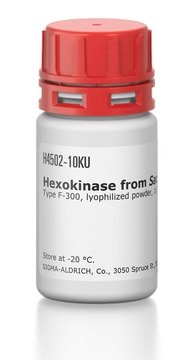S0937
Sucrose Phosphorylase
recombinant, expressed in E. coli, lyophilized powder, ≥45 units/mg solid
Synonyma:
SPase, disaccharide glucosyltransferase, sucrose glucosyltransferase, Sucrose:orthophosphate α-D-glucosytransferase
Přihlásitk zobrazení cen stanovených pro organizaci a smluvních cen
About This Item
Číslo CAS:
MDL number:
UNSPSC Code:
12352204
NACRES:
NA.54
Doporučené produkty
recombinant
expressed in E. coli
form
lyophilized powder
specific activity
≥45 units/mg solid
mol wt
56 kDa by SDS-PAGE
shipped in
wet ice
storage temp.
−20°C
General description
Research area: Cell signaling
Sucrose Phosphorylase belongs to glycoside hydrolase, GH13 family. It comprises of four domains with the glucose anomeric carbon-binding site and a glucoside-binding site. The active site residues include Asp192 and Glu232. It is majorly produced by bifidobacteria and lactic acid bacteria. The cross-linked sucrose phosphorylase aggregates is thermostable and could be exploited for industrial catalysis of glycosylation.
Sucrose Phosphorylase belongs to glycoside hydrolase, GH13 family. It comprises of four domains with the glucose anomeric carbon-binding site and a glucoside-binding site. The active site residues include Asp192 and Glu232. It is majorly produced by bifidobacteria and lactic acid bacteria. The cross-linked sucrose phosphorylase aggregates is thermostable and could be exploited for industrial catalysis of glycosylation.
Application
Sucrose Phosphorylase has been used in sucrose determination in wheat plant and in sucrose hydrogen production.
Sucrose phosphorylase has been used:
- To assess the enzymatic synthesis of stable, odorless, and powdered furanone glucosides.
- To investigate the novel transglucosylating reaction with carboxylic compounds.
- In sucrose determination in wheat plant and in sucrose hydrogen production.
Biochem/physiol Actions
Sucrose phosphorylase catalyzes the reversible conversion of sucrose (α-D-glucopyranosyl-1,2-β-D-fructofuranoside) and phosphate into D-fructose and α-D-glucose 1-phosphate. This reaction plays a crucial role in generating the vital glucose component through sucrose metabolism.(1)
Unit Definition
One unit will produce 1.0 μmole of D-fructose from sucrose per min with the corresponding reduction of NADP to NADPH at pH 7.6, at 25 °C.
Physical form
Contains sucrose as stabilizer.
signalword
Danger
hcodes
pcodes
Hazard Classifications
Resp. Sens. 1
Storage Class
11 - Combustible Solids
wgk_germany
WGK 3
Osvědčení o analýze (COA)
Vyhledejte osvědčení Osvědčení o analýze (COA) zadáním čísla šarže/dávky těchto produktů. Čísla šarže a dávky lze nalézt na štítku produktu za slovy „Lot“ nebo „Batch“.
Již tento produkt vlastníte?
Dokumenty související s produkty, které jste v minulosti zakoupili, byly za účelem usnadnění shromážděny ve vaší Knihovně dokumentů.
Zákazníci si také prohlíželi
Cloning and expression of the sucrose phosphorylase gene in Bacillus subtilis and synthesis of kojibiose using the recombinant enzyme
WangM, et al
Microbial cell factories, 17(1), 23-23 (2018)
Thornthan Sawangwan et al.
Organic & biomolecular chemistry, 7(20), 4267-4270 (2009-10-02)
Regioselective glucosylation of R-glycerate catalysed by sucrose phosphorylase in the presence of sucrose as the donor substrate provided the natural compatible solute (R)-2-O-alpha-D-glucopyranosyl glycerate with complete regioselectivity in an optimised synthetic yield of 90% R-glycerate converted and a concentration of
Mario Mueller et al.
FEBS letters, 581(20), 3814-3818 (2007-07-31)
Site-directed mutagenesis was used to examine the specificity of Leuconostoc mesenteroides sucrose phosphorylase for utilization of fructose and phosphate as leaving group/nucleophile of the reaction. The largest catalytic defect in Arg(137)-->Ala (approximately 60-fold) and Tyr(340)-->Ala (approximately 2500-fold) concerned phosphate dependent
A Kasperowicz et al.
Journal of applied microbiology, 107(3), 812-820 (2009-03-27)
To verify the taxonomic affiliation of bacterium Butyrivibrio fibrisolvens strain A from our collection and to characterize its enzyme(s) responsible for digestion of sucrose. Comparison of the 16S rRNA gene of the bacterium with GenBank showed over 99% sequence identity
Structural rearrangements of sucrose phosphorylase from Bifidobacterium adolescentis during sucrose conversion
Mirza O, et al.
The Journal of Biological Chemistry (2006)
Náš tým vědeckých pracovníků má zkušenosti ve všech oblastech výzkumu, včetně přírodních věd, materiálových věd, chemické syntézy, chromatografie, analytiky a mnoha dalších..
Obraťte se na technický servis.









